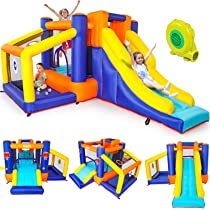
For parties and events, the 11x11 bouncehouse is a popular rental choice. It can be rented in various sizes and is suitable for all ages. The bounce house can be used to entertain guests at any occasion, such as a birthday party or anniversary celebration.
Maximum occupancy limit
It is essential to be aware of the maximum occupancy limit when purchasing a bounce house. Most cases this limit is determined by the jumping area. Manufacturers establish occupancy limits to protect bounce houses and their users. Also, a bounce-house might have a weight limit that will stop it from operating safely if it is overloaded.
Overloading the bouncehouse will cause deflation. This can cause damage to the bouncehouse's material and seams. Be aware of deflation signs to avoid this.
Limit on weight
Here are some things to remember when renting an 11x11 bouncehouse. First, be sure to know your weight limit. These weight limits will protect you from injury-causing deflation. A bounce house’s weight limit is typically between 70 to 75 percent of its maximum. This is to prevent injuries and ensure the safety of all bounce house occupants.

It is important to be aware that the weight limit on a bouncehouse is not hard or fast. Manufacturers will list the maximum and minimum weight for their bounce house. The manufacturer may not have an exact range because children vary in height and weight.
Height limit
It is important to know a few basic things about setting up an 11x11 inflatable bounce house. First, you need to be aware that most bounce homes require 15 feet vertical clearance. Larger ones may require more, as much as 22 feet. You may be allowed to use 10 feet for smaller bounce homes.
Another thing to keep in mind is the weight limit. Most bounce houses can hold around 200 pounds. Some bounce homes are suitable for toddlers but have lower weight limits. Make sure you know the inflatable's height limit so your guests don't get too tall or too small.
Size limit
When deciding how big to get your bounce house, you'll need to consider how many people will be using it at one time. You'll also want to know how much each person weighs. Maximum weight should not exceed seventy-five to seventy percent of the total capacity. This creates a safety buffer that prevents the bouncehouse from becoming overloaded.
A label located near the entrance usually indicates the weight limit for a bouncehouse. The weight limit for larger bounce houses is usually much higher than for smaller ones. Be aware that children's height and weight vary, so the manufacturer's recommended weight limit may not be the correct one for your party.

Renting a bounce house is expensive
There are many ways to save money on renting a bouncehouse. First, check out the delivery and setup charges. These fees can be included in the rental fee. Some companies charge extra for cleaning, sanitizing, assistance with children, and other services.
Cost to rent a bouncehouse depends on the size and duration of the event. A small bounce house will run around $100 while a large bouncehouse will run about $640. You may need to pay more for larger bounce house attachments. In addition, larger bounce house setups take longer and require more attention to transport.
FAQ
Does it make sense to ask for discounts on shopping?
Try to negotiate a better deal when purchasing items. It is not rude to ask them if there are any discounts codes. You can ask politely if they have any discount codes. This could save your money over the long term.
How to avoid fraudulent use of credit cards online
Make sure to review your credit card statements before you buy online. Only pay the bills you owe. Regularly check your bank statement to find out if anything is suspicious. Call your card issuer immediately if you see any unusual charges. They will cancel the transaction and usually refund any money taken from your account.
If you feel you've been victim to fraud, you can contact your local authorities. You can file a report with the Federal Trade Commission (FTC) as well.
Is it worth signing-up for insider and reward programs at your local shop?
Although rewards can be great, they are not always worth the effort. You should ensure that you receive value when you sign up for an internet program. You should know how much money and time you are spending on it.
If you are signing up for a rewards card just because it has a good signup bonus, be careful. Sometimes these bonuses won't be worth the effort to apply for one.
Ask yourself why you are interested in joining rewards programs before you sign up. Many times people join just because their friends are doing it. If you don't have an interest in the company's products and services, you won’t be able to stay with it for long enough to reap the rewards.
Do I need to worry about my privacy when I shop online?
Consumers need to be aware of what information they give away when using an online service like Amazon.com. Asking consumers if they would like to share their personal data with Amazon is a good idea. If you don't wish to share such information, you may need to limit your shopping experience on sites you feel comfortable sharing your private details.
Statistics
- An approximately 90% increase in price affords Hotel X the opportunity of extreme profits under severe circumstances. (dos.ny.gov)
- A report from the U.S. Census Bureau found that in the first quarter of 2022, an estimated $250 billion was spent on retail e-commerce sales.1 (thebalance.com)
- According to the Federal Trade Commission (FTC), online shopping was the fourth most common fraud category for consumers as of February 2022.5 (thebalance.com)
- Beyond that, you'll be liable for a 25% import tax. (makeuseof.com)
External Links
How To
How to shop online safely
Online shopping is one way to get goods and services at a very convenient price. But, convenience comes with a cost. There are benefits, but also dangers to shopping online. Identity theft is the most serious risk. Identity thieves use your personal data (name, address, credit card number) to steal money from you or take out fraudulent loans against your name. They then sell your stolen information on the black market. Here are some tips to help you keep your business online safe.
-
Secure websites are recommended. SSL encryption is free for most online stores. Any information entered on the site, including names and addresses, phone numbers, credit card details, and so forth, is encrypted. It blocks anyone from seeing the information you enter. When choosing which online store to do business with, ensure they have a valid certificate issued by a recognized CA. When browsing, look for the padlock icon in the URL bar.
-
Your password should not be divulged. When you first sign up for a new account, you usually receive an email asking you to confirm your email address and/or username. Make sure you don't share these credentials with any third party. Also, don't write them down anywhere because if someone steals your wallet, they could access your accounts too! Instead, store them on your computer. You should also change your passwords regularly - every three months is recommended.
-
Keep track on your orders. Sending items to yourself and others is a good idea. Keep track of the addresses you send them. Many people fall prey to fraud by believing that they sent something to themselves but it was actually sent to someone else. Before paying for shipping, make sure you verify the tracking number. Never ship anything without receiving proof of delivery. If you're unhappy with the service received, please contact the company immediately.
-
It is important to know who you are dealing. Many websites will require you to give sensitive information, such as your full name and date of birth, Social Security Number, and Bank Routing number. These details help them identify you, so be careful about giving them out. Google "what's the need?" to determine if a website has this information. You'll find many answers.
-
Pop-up windows can be annoying. Pop-up windows can bombard you with offers and special deals from many sites. Some of these ads may seem legitimate, but others are designed to trick you into revealing private information. For example, an anti-virus program may ask for your credit card number, bank information, and social insurance numbers. Don't click on any links that seem suspicious to avoid being tricked.
-
Phishing scams can be dangerous. Phishing scams involve hackers pretending to be from reputable businesses in order for consumers to hand over their financial details. Phishers may send emails that appear to be from retailers or banks, inviting users to log in and update account information. Once your financial information has been given, hackers can take control of your finances. Hackers can also empty your bank accounts and transfer funds between accounts. The following resources can help you identify phishing scams.
-
Do your homework. Before signing up for a deal, always read the fine print. The terms and conditions of any contract you agree to must be clear and easy to understand. You should carefully read through the contract and make sure you understand what you are agreeing to. To save money, avoid paying hidden fees.
-
You can shop around. Don't be afraid to shop around. Compare prices on different websites until finding the lowest price. Also, compare shipping costs when ordering multiple items. Shipping costs can vary greatly depending upon which website you use. For expedited shipping, it is worth paying a bit more.